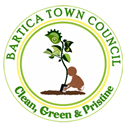Economic and Social Impact
The emergence of renewable energy schemes is occurring against a backdrop of growth in both energy demand and carbon dioxide (CO2) emissions associated with climate change. With what is now known, renewable energy and energy efficiency are crucial for improving security of energy supply and seizing opportunities from the low carbon economy as well as addressing climate change.
The municipality of Bartica, although a relatively new will be seeking to seize the opportunity to lead the response at the local level by encouraging and helping other public entities, residents, businesses and organizations to reduce their energy consumption and transition to clean energy while improving their socio-economic status.
This driver comes at an opportune time where oil prices are unstable, electricity supply in Bartica is not only “dirty”, but also grossly unreliable and expensive.
Exploring clean energy options can provide Barticians with reliable and probable cheaper source of energy. This would not only stimulate growth and socio-economic development, but will do so in a sustainable manner.
Since Bartica is expected to be the model Green Town, there are significant implications for Bartica and Guyana as whole.
Some of the projected Socio-Economic impacts of this project are as follow:
- Data collected from this pilot project will serve to inform a competitive bid process for large scale renewable energy supply for Bartica. Clean, cheaper and reliable energy can attract large scale direct investment and also has the opportunity to be a net exporter of energy to neighboring communities. The possibilities and trade off in terms of capital flows, increasing the local market for low carbon goods and services, green job creation, technology and skill transfer can be tremendous.
- Energy conservation can also play a significant role in energy savings; in fact this is regarded as the frontline approach in this process. Sensitization and awareness in energy savings can provide tangible economic and social benefits through behavioral changes and attitudes.
- The energy efficiency pilot program for public buildings and facilities is expected to result in significant energy and economic savings. The annual payments to the utilities can instead be placed into a renewable energy revolving fund managed by the council from which the program can be sustained. With a clear renewable energy strategy, the council will be in a position to support energy savings initiatives and programs in new public buildings and spaces, including schools, social housing, leisure facilities, civic centers and town halls.
- Equally important is the street lighting program here. Adequate luminance is necessary for security, safety and late night commerce. Especially where vulnerable women and children are often left alone while their male providers seek employment away in the remote gold fields’ areas. It is necessary that single women and children be provided with the necessary public good to support their wellbeing and development.
- Also, the manufacture and installation of energy efficient equipment and materials is a relatively labor-intensive activity that has the potential to boost local labor markets. However, the skills requirements are often quite specific, so there could be a role for active intervention in providing training to local workforces. A stimulus to employment may also arise as a result of the export potential of energy efficiency activities. This in itself can create additional green jobs and economic returns.
- The community baseline audit would be a first for Bartica and it would provide a sense of the local baseline energy characteristics and performance. Having this data is crucial to the socio-economic improvement of every citizen. There are clear health benefits, both physical and mental, from providing homes and buildings that are adequately ventilated, cooled and lighted. Improvements will be of particular benefit especially to children. The audit would also help to highlight areas for potential energy and economic savings, inform them of the interventions necessary to improve their status quo and inform of collective possibilities for the community as a whole. For instance, the audit can suggest that 90% of the existing refrigerators are inefficient, prompting a broadbased community exchange or buyback program for more efficient models.
- Transportation in Bartica is primarily by road and water. In addition to the economic and environmental benefits of energy efficiency in transport that this program intends support, much recognition must be given to the ensuing co-benefit of reducing pollutants from vehicles and reduce the incidence and severity of respiratory and cardiovascular diseases.
